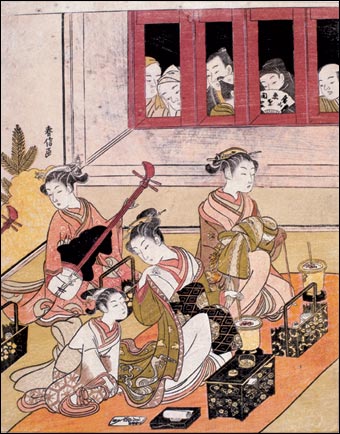
Suzuki Harunobu, Courtesans exposed to the view of passers-by. Edo period, c. 1769. |
|
Galeries nationales du Grand Palais
Clemenceau Entrance
75008 Paris
Information
Tel. +33 1 44 13 17 17
www.rmn.fr/monde-flottant
e-mail : information.gngp@rmn.fr
Opening Times
Every day, except Tuesdays, 10:00 am to 8:00 pm,
Wednesdays, from 10:00 am to 10:00 pm.
Ticket office closes 45 minutes before closing time.
Closed 25th December.
Entrance Fees
With reservation, from 10:00 am to 1:00 pm: 11,10 €.
Without reservation, from 1:00 pm:
Full price 10 €. Concessions 8 €.
Free for children under 13, unemployed and pensioners.
Exhibition Curator
Hélène Bayou, Curator,
National Museum of Asiatic Arts-Guimet.

|
Thanks to exceptional loans of works, often exhibited for the first time, from foreign collections, principally Japanese, both public and private, combined with a selection of the finest prints from the National Museum of Asiatic Arts-Guimet, this exhibition brings together some 50 paintings, mounted on folding screens and scrolls, and 150 prints. They give a thorough insight into the stylistic and iconographic language and the various paths followed by artists of the Floating World during the last quarter of the eighteenth century.
A fringe society
In 1603, Edo became the capital of Japan as peace descended on the country. In the subsequent period of prosperity and optimism, pleasure quarters sprang up on the outskirts of the larger towns. The focal points of these quarters were two new institutions: teahouses and Kabuki theatres, the haunts of courtesans, dancers and actors who were venerated like icons. This fringe society was known as "the Floating World",ukiyo. The physical and spiritual gestures that developed within it gave rise to a new pictorial style which focused on women: ukiyo-e "painting of the Floating World". Sensuality was expressed through new themes that mingled references to medieval literature with everyday life in Edo: reading a letter, an actor dressing up, getting ready for the day, mirrors and motherly love. Women were shown as willowy figures, slender and surprisingly curved.
The cult of beauty and fleeting pleasures
The patrons of ukiyo-e were newly rich city merchants. These pictures reflect a new existential attitude centered on the cult of beauty and fleeting pleasures. In the early seventeenth century, the Kano school produced genre paintings mounted on large screens with gold backgrounds. They depict the passing seasons or famous places, long celebrated for their beauty. Around 1650, anonymous artists, inspired by the burgeoning pleasure quarters, reversed the relationship between landscape and characters by bringing the human figure to the fore. This is followed by portraits, painted on scrolls, of "beauties reading’"or "going for a walk", which accentuate the feminine sensuality of women in luxurious kimonos that echo the fashions of the floating world as well as medieval literature, the Tale of Genji or the Tales of Ise.
The representation of the body underpins the entire exhibition: from the absence of the nude as a pictorial bias to the full-blown erotic series, shunga, literally "images of spring".
PUBLICATIONS
- Exhibition catalogue, in French, 23 x 30.5 cm, 400 pages, 400 colour illustrations, 45 €, éditions RMN.
- Petit Journal, English and French versions, 16 pages, 30 colour illustrations, 3 €, éditions RMN.
- Le Monde des estampes japonaises, 17.5 x 12.5 cm, 48 pages, 7,50 €. Hors Série "Découvertes Gallimard", copublication RMN-Découvertes Gallimard
|








